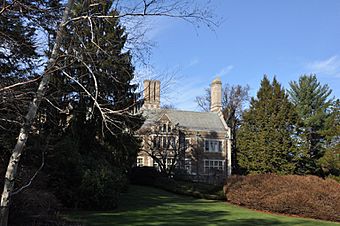Fernwood (Brookline, Massachusetts) facts for kids
Quick facts for kids |
|
|
Fernwood
|
|
 |
|
| Location | 155 Clyde St., Brookline, Massachusetts |
|---|---|
| Area | 2.7 acres (1.1 ha) |
| Built | 1909 |
| Architect | Patch, Charles; Olmsted Bros. |
| Architectural style | Tudor Revival, Jacobethan Revival |
| MPS | Brookline MRA |
| NRHP reference No. | 85003264 |
| Added to NRHP | October 17, 1985 |
Fernwood is a beautiful old house located at 155 Clyde Street in Brookline, Massachusetts. It was built in 1909. This house is a special example of a style called Jacobethan architecture. It's one of the few large country homes from the early 1900s still standing in the town. Fernwood was added to the National Register of Historic Places in 1985. This means it's recognized as an important historical place.
Exploring Fernwood's Design and History
Fernwood is in the southern part of Brookline, in an area called Buttonwood Village. The house is part of what used to be a much larger estate. Today, the estate has been divided into smaller properties. You can reach the main house by driving along what is now Fernwood Road.
What Does Fernwood Look Like?
The house is a large, two-and-a-half-story building made of stone. It has brick walls and fancy limestone decorations. You'll notice rows of windows with rectangular glass panes. The roof has steep, pointed gables, which are the triangular parts of the wall at the end of a pitched roof. These gables have flat tops, called parapets. The house also has rounded arch doorways. Inside, the house is built with strong steel beams. Interestingly, it doesn't have any wood finishes inside.
Who Lived at Fernwood?
The land where Fernwood stands was once owned by Thomas Handasyd Perkins in the late 1800s. His own large estate was right next door. He gave this land to his daughter, Caroline, and her husband, William Gardiner.
In the early 1900s, a retired merchant from New York named Alfred Douglass bought the property. He tore down the old house that was there. Then, he had Fernwood built in its place. The famous architect Charles Patch designed the house. The beautiful gardens and outdoor areas were planned by the Olmsted Brothers. They were very well-known for their landscape designs.
The Jacobethan or Tudor Revival style of the house was very popular back then. This style mixes elements of Elizabethan and Jacobean architecture. Alfred Douglass didn't live at Fernwood for very long. He had to sell the estate in the 1910s because of money problems. Later in the 20th century, the Fernwood estate was divided into smaller pieces. Even the servants' quarters were separated and became their own property.



